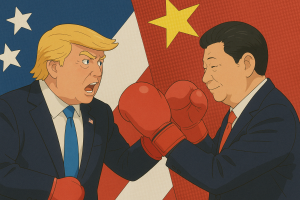Stay connected with BizTech Community—follow us on Instagram and Facebook for the latest news and reviews delivered straight to you.
On Monday, 20 January 2025, Gary Gensler officially ended his tenure as Chairman of the United States Securities and Exchange Commission (SEC). His resignation coincided with the inauguration of Donald Trump as the 47th President of the United States, which became a pivotal moment in the dynamics of capital market regulation in the United States.
Gensler’s Tenure at the SEC
Gensler has led the SEC since 2021, and under his leadership, many policies and decisions have been in the spotlight, especially related to the digital asset and crypto sectors. Gensler is known to be firm and often controversial in enforcing regulations on crypto assets, which has sparked a lot of debate among industry players and policymakers.
Under Gensler’s leadership, the SEC launched several legal actions against crypto companies, including measures that prompted the rejection of crypto-based exchange-traded fund (ETF) products. However, despite much resistance, a court ruling forced the SEC to finally approve crypto ETFs, which was considered a major victory for the industry.
Gensler’s View on Crypto Asset Regulation
One of Gensler’s signature positions is his view that existing securities laws are sufficient to regulate the digital asset market. While this view gained support from some federal judges, it also drew criticism from those who argued that existing regulations were insufficient to address the dynamics of the rapidly evolving crypto market.
By the end of his tenure, the legal and regulatory status of crypto remained a topic of intense debate in the courts and professional circles, demonstrating how complex the regulatory challenges of the sector are.
Change of Leadership at the SEC: New Hope for the Crypto Industry
The resignation of Gary Gensler is considered an important turning point for the future of crypto regulation in the US. This is evident from the number of crypto ETF applications that came in just hours after Gensler officially left his post. The move reflects renewed optimism among crypto industry players who are hoping for more supportive policies for the sector.
As a first step, the US White House has appointed Mark Uyeda as Acting SEC Chairman. Uyeda, who previously served as an advisor to Paul Atkins, is known to have a more moderate view of the crypto industry. He has publicly expressed his support for ending the SEC’s “war on crypto,” a statement that sends a positive signal to an industry that has been facing strict policies from the SEC.
Mark Uyeda is not expected to make major policy changes, but he is seen as more friendly to the crypto industry. One policy that has come under scrutiny is Staff Accounting Bulletin 121 (SAB 121), which is seen as making it difficult for banks to provide services to digital asset clients. Uyeda stated that the policy should be removed, and he now has the authority to take that step.
Meanwhile, Paul Atkins, who was chosen to permanently replace Gensler, is known to have close ties with the crypto sector. Atkins has a business background related to consulting in the industry, which gives new hope for the development of more crypto-conducive regulations.
CFTC Chair Resignation: Caroline Pham as Acting Chair
In addition to Gensler, the Chairman of the Commodity Futures Trading Commission (CFTC), Rostin Behnam, also officially stepped down as previously planned. Caroline Pham, known as a proponent of more crypto-friendly regulations, was appointed as the Acting CFTC Chair. Pham and Uyeda are seen as strategic partners with pro-crypto views, and are expected to strengthen cooperation between the two agencies in regulating the crypto sector.
With these changes, the future of crypto regulation in the United States points to a more flexible and open direction for this growing sector. However, it remains to be seen how the new policies will be implemented, as well as how the courts and other institutions will respond to these regulatory changes.






